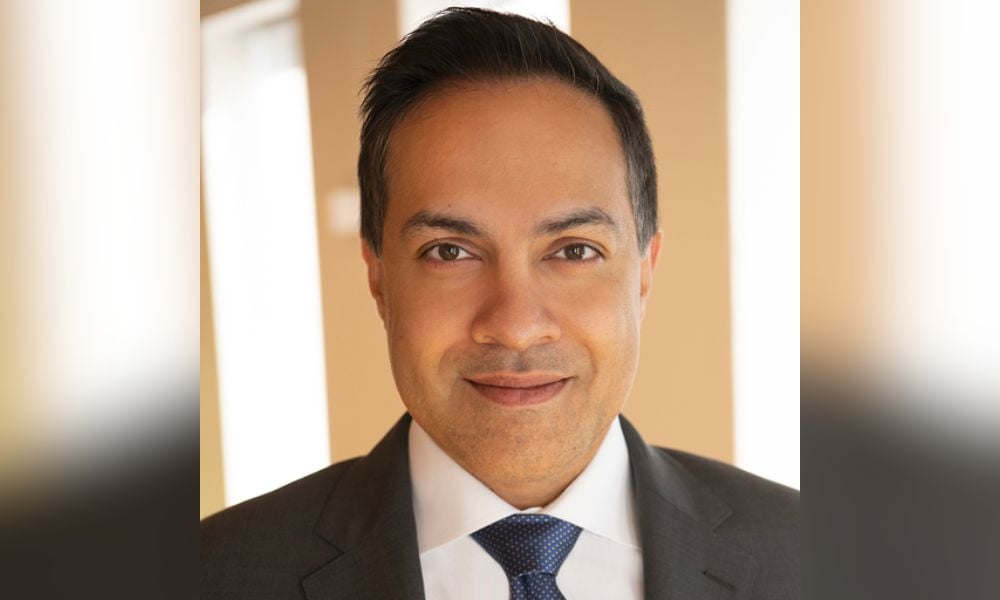'We're cooks. And this is a new ingredient'

Canadian Lawyer recently spoke with founder and CEO of LexCheck Gary Sangha. The conversation covered the “hype” of generative AI, its potential, its risks, and the future of a technologically augmented legal industry. *The interview has been edited for length and clarity.
Can you tell me about your professional background?
I'm a serial legal tech entrepreneur. I’m a former corporate lawyer who just saw a lot of inefficiencies in legal that I thought tech can potentially solve. My first startup Intelligize is the market leader for SEC filings research. It was acquired by LexisNexis in 2016. I was a law professor along the way. And then I started LexCheck to help in-house counsel to do their work more efficiently.
I'm biased. But my view of legal is that we are front office. We're the deal closers. How do I unlock my people? How do I unlock legal to help close deals out? That's kind of been the driving mission for LexCheck.
When did you begin working with AI in the legal sphere?
We've been working with AI for years. We started working on AI around 2019 on our own proprietary tech, which was rules based, and natural-language-processing based. In terms of generative AI, we started working on that this year, just like most folks.
The hype is crazy, right? I am a fan. I'm very excited. But the hype is crazy. What we want to do is just kind of see where the dust settles, see where the advantages are, see where the generative AI stuff is lacking, and then focus our energies where it makes the most sense. It's a process.
My sense is this is really cool stuff. It can do a lot of neat things. But it's an ingredient to do dedicated things.
For LexCheck, we want to solve contract negotiation. How do we make that simple and easier? How do we use AI to automate the first-round review, for example? Generative AI is not some magic that is going to do that. But you can layer in gen AI to do specific tasks that can help solve this problem.
We’re cooks. And this is a new ingredient.
Tell me a bit more about your excitement about the potential of this technology for the legal profession?
I am a techy, so I think this can do a lot of cool things – contacts, drafting, researching. Is it the second coming of Christ? No. But I do think it’s going to unlock a lot of productivity. The key thing that I want to emphasize is I don't think this is, in any way, going to replace lawyers or legal work.
But, used properly, it can unlock a lot of opportunity.
What are the most common risks associated with AI in any legal industry?
Off the top, I would say they would clearly be errors, lack of nuance, and privacy issues.
In terms of errors, the whole point of these chatbots is they’re designed to keep the conversation going. They're not designed to be accurate. They're going to create things – hallucinations are what they are calling them. For legal, where precise language and precise information is important, it’s not optimized. It’s going to make mistakes and errors.
Lack of nuance. Legal requires empathy. Each client is unique. Each situation is unique. You can't just put in someone’s unique circumstance into a chat bot and expect it to have a tailored response.
Then, lastly, privacy issues. It goes without saying that anything you throw into OpenAI is now part of their training tool. You've got to be very cognizant about that. Obviously, we don't know what it's trained on. And there's all sorts of issues. For example, AI discrimination.
As someone who designed tools to be used in legal operations, how do you navigate these risks? What are your ethical considerations? How do you still apply this technology?
Because we're a more established startup, we have a list of customers. We're not in the business of over-promising. We're very, very cognizant about the downside risks of this technology. We take a very measured approach.
We're about to release our own AI copilot that can do a lot of neat things. But it’s just understanding that you don't want to have this technology lead. Our AI is a rules-based engine, and the generative AI is a nice complement. It’s a nice assist to make some of the rules more powerful. We are not leading with generative AI.
We're leading with our own existing tech. Having specific things that we already do, this makes them a bit better.
What does the future have in store for the legal industry’s technological advancement?
I think the future is super bright. The world needs legal services. There is such an excess in demand for lawyers which is why legal fees are skyrocketing.
The world needs legal. They need more lawyers. And that is what this technology does. It unlocks a lot of productivity. What this means is lawyers do more things and they can do those things better.










